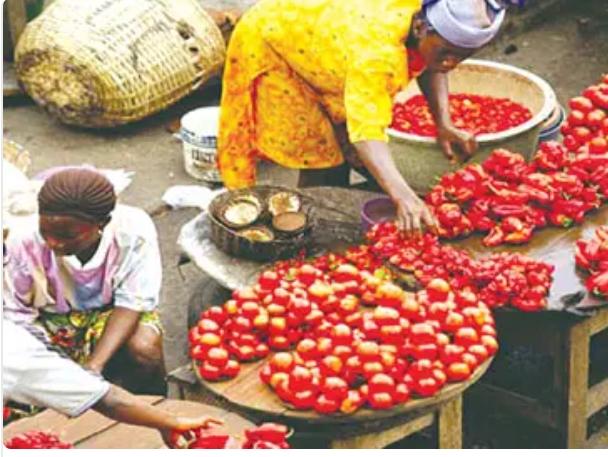Business
Tomato Scarcity Looms, As Farmers Lose N1.3bn, 300 Hectares To ‘Ebola’
Published
12 months agoon
By
Editor
Tuta Absoluta, also known as Tomato Ebola, is currently ravaging tomato farms in parts of the country, costing as much as N1.3 billion is economic dimensions, with scarcity looming.
The situation has led to a collaborative efforts by Federal Government; Nigeria Agribusiness Group, NABG; Hort Nigeria; Nigerian Horticultural Research Institute, NIHORT; Sygenta; International Institute of Tropical Agriculture, IITA, and others to tackle the dosease.
They raised the alarm over Tomato Ebola at a briefing by Horti Nigeria, supported by the Netherlands, adding that the ravaging insects were ruining huge investments of farmers in Kano, Kaduna, Katsina and Gombe States.
The President, NABG, Emmanuel Ijewere, said stakeholders have resolved, therefore declared total ‘War’ on the invading insects.
Ijewere pointed out that the worrisome development cannot be left alone for the farmers as NABG was organising a stakeholders’ meeting to address the challenge, because it is the farmers who are the major sufferers and not even the processors, in the sense that they have invested heavily on their farms for tomato production.
READ ALSO: How I Lost N500m To Non-smoking Nightclub Business — Comedian AY
He said: “Tuta Absoluta is an insect that has ravaged tomato farms and from what we have discovered, the insect is very devastating to the tomato and is so smart.
“The insects have decided to build their homes under the leaves and when the insecticide is sprayed it doesn’t affect them.
“The affected states are mainly Kano, Kaduna, Katsina and Gombe, but the insects don’t need visa to go to any other states as far as the conditions are right.
“Climate change has enhanced the movement of pests around the field; the warm environment helps them to spread wide, increased humidity allow these pests to thrive, hence the new outbreak of Tuta Absoluta.
“We are glad to have the Federal Ministry of Agriculture and Rural Development here and we are working together to solve this problem.
“The bottom line is that the biggest sufferers are farmers who are already in trouble, and they have invested in buying inputs, and it is time to harvest and there is nothing to harvest.
“It is ‘war’ we are going to declare against these insects and all of us here will be providing the ‘weapons’ to achieve it.”
READ ALSO: Naira Scarcity May Affect Private Business In Q1 – Report
Ground Zero
Also in a remark, the Director, Horticulture, Federal Ministry of Agriculture and Rural Development, Dr Deola Lordbanjoce, explained that, “This current crisis with Tuta Absoluta started from Galama Local Government in Kano.
“When it was reported we started our investigation and we found out that about 300 hectares in that Local Government alone were affected by this infestation.
“And from our end we need to look into the economics of what we are talking about.
“Then we got to know economically that the farmers in that local government arising from the infestation of Tuta Absoluta may have lost about N1.3 billion.
“We are working in collaboration with the National Tomato Growers, Processors and Marketers Association of Nigeria every time and investigating what is happening in other states.
“And we have our records already and we are working on two things; the Ministry is convening a stakeholders’ meeting, which may be merged with what NABG is planning.
“Number two, the Ministry is sourcing for funds seriously and interventions to solve critical problems of Tuta Absoluta and we are making some money available to NIHORT to produce the hybrid seeds they just developed and to procure some IPM packages to control Tuta Absoluta.
READ ALSO: NDE Disburses N1.4 Million To Micro Business Owners In Bauchi
“Our tomato need as a country is about 5.4 million metric tones and we cannot meet the 1.3 million metric tonnes deficit, and now that we have Tuta Absoluta that means the deficit will rise to three metric tonnes.
“That is a crisis if that is allowed and will aggravate the cost of purchase by consumers, which will indeed go high.”
The Executive Director and Chief Executive Officer, CEO, NIHORT, Dr Mohammad Attanda, represented by the Head, Biopesticide Center, NIHORT, Oladigbolu Abiola, recalled that in 2015, the pest caused monumental destruction and disruption of the tomato value chain.
“The sole dependence on synthetic insecticides for the control of Tuta has resulted in development of resistance – a change in the sensitivity of Tuta population to synthetic pesticides, resulting in the failure of a correct application of the pesticides to control Tuta as is being experienced now, hence aggravating outbreaks whilst the food security of the nation is threatened.”
Recommendations
However, amongst recommendations made by the NIHORT boss include; Federal Ministry of Agriculture and Rural Development to incorporate
NIHORT sustainable Tuta Integrated Management Package for tomato production in the national tomato policy to stem the tide of this occurrence;
Farmers should strive to adopt the planting of NIHORT’s recently released tomato seeds bred for high yield, tolerance to fusarium, good shelf life and nutrition qualities.
The Director General, DG, NABG, Dr Manzo Maigari, recalled that in 2016 and 2017, the level of Tuta Absoluta’s devastation reached an epidemic level, but NABG along with other partners proffered some solutions.
READ ALSO: CBN’s New Policy Will Lead To More Job Losses, Disorganize Businesses – University Don
“Today it (Tuta Absoluta) is back and we have to call on these major stakeholders to come together so that we can agree on the way forward.
“We have also seen the entrance of a new stakeholder, Horti Nigeria, funded by the Dutch Government, and they also have a regime of practices that has proven beneficial to farmers because in the clusters that are managed by them so far there is resistance by the Tuta Absoluta.
“Therefore, this adds to the bouquet of solutions we want to present to farmers so that the whole thing will have an integrated approach,” Maigari stated.
Meanwhile, the Secretary General, National Tomato Growers, Processors and Marketers Association of Nigeria, Sani Danladi, lamented the huge losses over 500 farmers have incurred in Kano, while they are yet to know how many farmers are being affected in Katsina, Jigawa, Kaduna and Gombe.
Danladi said: “This ‘war’ is not only for the government and farmers but for all Nigerians.
“When Tuta Absoluta enters the farmer’s farm it destroys everything there within three days no matter how big or small it is.
“It is very devastating because it destroys all investment in the farm.
“Looking at the quantum of investing on one hectare of farmland to produce tomato it costs not less than N1.7 million.
READ ALSO: NDE Disburses N4.5m To 228 Business Owners In Bauchi
“It is not a small amount of money farmers are losing every year of this disease manifests.
“It is not occuring early in the season but when temperature rises to high degrees and that is why some farmers are afraid in going into late transplanting of tomato.
“From January to March, tomato is very cheap in Nigeria but from April upward it becomes very scarce because farmers are afraid of doing late transplanting.
“This year the devastation is very high because we had low production and the disease came and ravaged all produced by the farmers and that is why we have come out to cry and tell the government and Nigerians that on this issue we have to take a holistic approach to proffer solutions.
“We have reported it to the Federal Ministry of Agriculture and Rural Development, NABG and other stakeholders on how can we stop the spread of this disease because we are afraid it might spread to other States.
“This year more than 300 hectares have been destroyed by this disease which affected more than 500 farmers only in Kano State, but also affected farmers in Kaduna, Katsina, Jigawa and Gombe States, and we are still collecting the data from the remaining states, and that is why tomato is very scarce now.
“Now 90 per cent of tomato in Kano has gone because of Tuta Absoluta devastation.
“It is different from caterpillars but this one is very devastating as you can’t eat it because is dangerous to human health.”
VANGUARD

The Central Bank of Nigeria (CBN) started fresh and direct sales of US dollars at N1,021 per dollar to Bureau De Change operators.
Nigeria’s apex bank disclosed this in a circular signed by its Director of Trade and Exchange Department Hassan Mahmud.
“We write to inform you of the sale of $10,000 by the Central Bank of Nigeria (CBN) to BDCs at the rate of N1,021/$1. The BDCs are in turn to sell to eligible end users at a spread of NOT MORE THAN 1.5 percent above the purchase price,” the circular posted on its website read.
READ ALSO: Tinubu Unveils African Counter-Terrorism Summit
“ALL eligible BDCs are therefore directed to commence payment of the Naira deposit to the underlisted CBN Naira Deposit Account Numbers from today, Monday, April 22, 2024, and submit confirmation of payment, with other necessary documentations, for disbursement of FX at the respective CBN Branches.”
CBN’s move is coming as the naira is recording a slight depreciation against the dollar after weeks of gains.
In late March, the bank also sold $10,000 to each of the eligible Bureau De Change (BDC) operators in the country at the rate of N1,251/$1.
READ ALSO: Mixed Reactions Trail Video Of Couple’s Customised N200 Notes
Like in the most recent sales, it warned BDCs against breaching terms of the dollar sales, vowing to sanction defaulters “including outright suspension from further participation in the sale”.
The fortunes of the naira have fallen sharply since President Bola Tinubu took over in May. Inflation figures have reached new highs and the cost of living hitting the rooftops.
Nigeria’s currency slid to about N1,900/$ some months ago at the parallel market. But in recent weeks, it has gained against the dollar.
The Nigerian authorities have also doubled down on their crackdown against cryptocurrency platform Binance and illegal BDCs.
On March 1, the CBN revoked the licences of 4,173 BDCs over compliance failures.

Olusegun Alebiosu has been appointed as the Acting Managing Director/Chief Executive Officer of First Bank of Nigeria Limited (FirstBank Group), effective April 2024.
Alebiosu steps into this pivotal role from his previous position as the Executive Director, Chief Risk Officer, and Executive Compliance Officer, a position he held since January 2022.
Alebiosu brings to the helm of FirstBank over 28 years of extensive experience in the banking and financial services industry. His expertise spans various domains including credit risk management, financial planning and control, corporate and commercial banking, agriculture financing, oil and gas, transportation, and project financing.
READ ALSO: JUST IN: Access Holdings Names New Acting CEO
Having embarked on his professional journey in 1991 with Oceanic Bank Plc. (now EcoBank Plc.), Alebiosu has held several notable positions in esteemed financial institutions.
Prior to joining FirstBank in 2016, he served as Chief Risk Officer at Coronation Merchant Bank Limited, Chief Credit Risk Officer at the African Development Bank Group, and Group Head of Credit Policy & Deputy Chief Credit Risk Officer at United Bank for Africa Plc.
Alebiosu’s academic credentials further enrich his professional profile. He is an alumnus of the Harvard School of Government and holds a Bachelor’s degree in Industrial Relations and Personnel Management. Additionally, he obtained a Master’s degree in International Law and Diplomacy from the University of Lagos, as well as a Master’s degree in Development Studies from the London School of Economics and Political Science.
READ ALSO: Meet Newly Appointed Union Bank CEO
A distinguished member of various professional bodies, including the Institute of Chartered Accountants (FCA), Nigeria Institute of Management (ANIM), and Chartered Institute of Bankers of Nigeria (CIBN), Alebiosu is renowned for his commitment to excellence and ethical practices in the banking sector.
Beyond his professional endeavors, Alebiosu is known for his passion for golf and adventure. He is happily married and a proud parent.
With Alebiosu’s appointment, FirstBank of Nigeria Limited anticipates continued growth and innovation under his leadership, reinforcing its position as a leading financial institution in Nigeria and beyond.
Business
CBN Gives New Directive On Lending In Real Estate
Published
1 week agoon
April 17, 2024By
Editor
The Central Bank of Nigeria, CBN, has released a new regulatory directive to enhance lending to the real sector of the Nigerian economy.
The directive, issued on April 17, 2024, with reference number BSD/DIR/PUB/LAB/017/005 and signed by the Acting Director of Banking Supervision, Adetona Adedeji, signifies a notable shift in the bank’s policy towards a more contractionary approach.
In line with the new measures, the CBN has reduced the loan-to-deposit ratio by 15 percentage points, down to 50 per cent.
This move aligns with the CBN’s current monetary tightening policies and reflects the increase in the Cash Reserve ratio rate for banks.
READ ALSO: JUST IN: CBN Gov Sacks Eight Directors, 32 Others
The LDR is a metric used to evaluate a bank’s liquidity by comparing its total loans to its total deposits over the same period, expressed as a percentage.
An excessively high ratio may indicate insufficient liquidity to meet unexpected fund requirements.
All Deposit Money Banks are now mandated to adhere to this revised LDR.
The CBN has stated that average daily figures will be utilised to gauge compliance with this directive.
Furthermore, while DMBs are encouraged to maintain robust risk management practices in their lending activities, the CBN has committed to continuous monitoring of adherence and will adjust the LDR as necessary based on market developments.
READ ALSO: JUST IN: CBN Increases Interest Rate To 24.75%
Adedeji has called on all banks to acknowledge these modifications and adjust their operations accordingly. He emphasised that this regulatory adjustment is anticipated to significantly influence the banking sector and the wider Nigerian economy.
The circular read in part, “Following a shift in the Bank’s policy stance towards a more contractionary approach, it is crucial to revise the loan-to-deposit ratio policy to conform with the CBN’s ongoing monetary tightening.
“Consequently, the CBN has decided to decrease the LDR by 15 percentage points to 50 per cent, proportionate to the rise in the CRR rate for banks.
“All DMBs must maintain this level, and it is advised that average daily figures will still be applied for compliance assessment.
“While DMBs are urged to sustain strong risk management practices concerning their lending operations, the CBN will persist in monitoring compliance, reviewing market developments, and making necessary adjustments to the LDR. Please be guided accordingly.”

Saudi Arabia Opens First Alcohol Store, Nigerian Muslims React

243 Passengers Cheat Death As Air Peace Plane Makes Emergency Landing At Lagos Airport

Edo Police Arrest Suspects Who Invaded Church, Kidnapped, Robbed Female Pastor
Trending

 Entertainment3 days ago
Entertainment3 days agoBridesmaids’ Dance At Wedding Causes Stir On Social Media [VIDEO/PHOTOS]

 Politics4 days ago
Politics4 days agoEdo Guber: Akoko-Edo PDP Leaders Meet In Igara, Describe Ighodalo, Ogie As ‘Perfect Match’

 Metro3 days ago
Metro3 days agoVIDEO: ‘UNN Lecturer’ Caught Pants Down With Married Student

 News4 days ago
News4 days agoOutrage As Chinese Supermarket In Abuja Denies Nigerians Entry

 News3 days ago
News3 days agoIGP, Jonathan Disagree Over State Police

 News1 day ago
News1 day agoVIDEO: Force PRO Orders Arrest Officers Caught On Video Bashing Driver’s Car

 Headline2 days ago
Headline2 days agoDrama As Women Fight Dirty, Breasts Fall Out During Spring Break Outing In US [PHOTOS/VIDEO]

 News1 day ago
News1 day agoDrama! Supporters Of Yahaya Bello Perform Rituals to Prevent His Arrest By EFCC [Video]

 Entertainment2 days ago
Entertainment2 days agoNollywood Actor, Zulu Adigwe Is Dead

 Headline2 days ago
Headline2 days agoMeet 17-year-old Nigerian Who Won $3.5m Worth Of Scholarships From Harvard, 13 Other Foreign Universities































